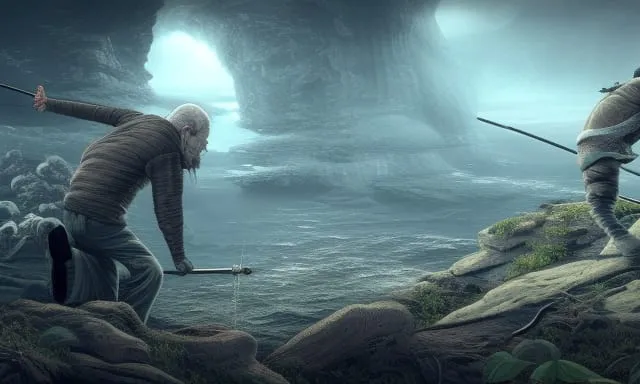
Such a great portion of our human lives involves paid work. There is an important sense in which we have been convinced that the ultimate goal of work is to pay off our debts, only to then retire. There is value in challenging the assumptions beneath this kind of myth, because so much of our lives are invested in what is at stake. Unless we come to a very clear understanding of what it is that we feel and what the outcomes are of our participation in this life, we will never arrive at any kind of satisfactory point, nor will we have divined any beneficial understanding of our place in the world.
Firstly, we have inherited a cultural premise that tells us that ultimate well-being can be postponed to the future. This is a very large assumption with far-reaching implications.
Your learned capacity to be happy in the future is a clear reflection of how you have learned to be happy now. Obviously, when the future seems to have arrived, that will also be ‘now’, so your appreciation of your present environment must be managed skilfully.
Have you ever come across people who are retired who cannot stop for one moment? The garden, the housework, the motorhome. These people are continuing the education of a lifetime of work, which is an ethic of keeping busy. People will object: ‘What is wrong if this is what they want?’, but do we really know what we want? Do we know what is best for us, and where we may have misunderstood?
For example, there is hidden assumption that many people have accepted which is that a lifetime of work is also a lifetime involved with suffering, therefore retirement from working life will also equate to retirement from a lifetime of suffering. Just how true is this assumption? It is true that much work, being the expenditure of effort under often physically or mentally stressful conditions, can promote much in the way of personal suffering.

What a lot of people fail to see is that leaving daily work behind is allowing the departure of only one source of suffering, it is not a salvation from suffering as a whole. In fact, the point at which we are accepted to have earned the right to withdraw from a lifetime of work is also the same point at which our mind as well as our physical body is beginning to deteriorate, marking the onset of all kinds of potential physical and medical challenges.
Suffering still follows at our heels from other sources, most notably the illness and death of friends, peers and loved ones who are also subject to the ravages of time. In this respect, retirement enjoys the benefit of a kind of afterlife mythology, in which all of our pain and effort on a daily basis will one day be ultimately vindicated and returned in full measure.
This raises an alarming question: just how much daily tolerance of misery does this mythology support? How many of us are laboring under the illusion that all of our effort is guiding us toward somewhere ultimate where we will have eternal peace and we can finally kick up our heels?
I share a couple of examples of this from my own life which I believe touch upon something relevant here.
I have a friend whose father is in his seventies, and despite remaining reasonably physically fit, he still works himself to the bone every day of his life. He is still in full time employment, despite that fact that he has been given the nod of approval that he could leave his work if he wanted to. Now, you might say ‘If he is doing what he wants to, why not?’ And I would naturally agree, except that all he ever seems to talk about is how much of a welcome change it is going to be when he finally retires.
This poses an odd kind of paradox in which he is on the cusp of retirement, and really past his culturally accepted retirement age, but the actual notion of stopping work seems to terrify him. His insistence on the myth of retirement has been well noted – he has waxed eloquent about the benefits of not having to get up in the morning, to not have to do anything, to have the freedom to kick back with a beer in his hand and watch TV (incidentally, this mythology is also recounted in minor form in the notion of the weekend, almost like a mythic foretaste of Valhalla).

The sad irony is, these are things he has not given himself the permission to enjoy. He may literally never arrive at the point at which he is comfortable with letting go of the ethic of early rising and hard work before he dies. To have lived this way for over seventy years, with no substantial appreciation for being able to allow himself to get a real break, is quite a confounding and yet exceptionally ubiquitous social phenomenon.
We could surmise it comes down to a person’s character and their ethos of being a hard worker, which unsurprisingly is a highly respected social value in any country. It could also be that like the rest of us, he has been successfully indoctrinated into a program of lifelong drudgery, being strung along by an imaginary dangling carrot.
Another example I will give was when I was working out of town one day, an older man came up to me struggling to walk with a stick and specifically wanted to tell me his story. We were the only two people around for at least a kilometer, and he specifically made the effort to approach me from a distance of about three hundred meters.
He told me that he was a keen hunter and fisherman, and that shortly after retiring, he had experienced a stroke which meant that there was no aspect of his retirement he felt he could enjoy. He told me that he worked his whole life, expecting to be able to retire and do what he wanted, except now he felt he had been cheated out of it.
While I don’t believe there is nothing he could have left of value in his life, the fact remains that we do place an inordinate amount of good faith in the application of effort over decades of our lives hoping to have something tangible to show at the end of the process. How does this contribute to us putting off our lives now, and how are we foregoing our responsibility to live wisely and skilfully today?
Are we collectively so enamoured by the prospect of the future holding some form of salvation, either material or spiritual, that we can justify subjecting ourselves to misery today? What would we do differently today, what changes would we be willing to allow in our lives if we discovered the possibility that our imagined future with its ease, relaxation and distance from suffering would never eventuate?
*
Simon P Murphy is a Nelson-based esotericist and philosopher, and author of His Master’s Wretched Organ, a brilliant collection of weird fiction stories.
*
If you enjoyed reading this essay/article, you can get a compilation of the Best VJMP Essays and Articles from 2021 from Amazon as a Kindle ebook or paperback. Compilations of the Best VJMP Essays and Articles of 2020, the Best VJMP Essays and Articles of 2019, the Best VJMP Essays and Articles of 2018 and the Best VJMP Essays and Articles of 2017 are also available.
*
If you would like to support our work in other ways, subscribe to our SubscribeStar fund, or make a donation to our Paypal! Even better, buy any one of our books!
